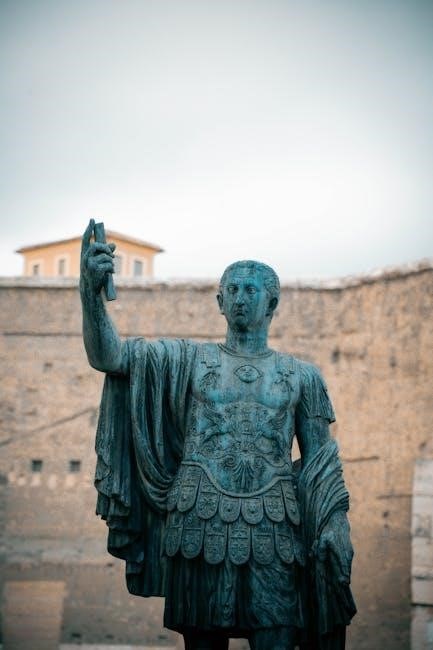
julius caesar questions and answers pdf
This PDF resource provides comprehensive study materials, including summaries, analysis, and answers to key questions about Shakespeare’s Julius Caesar.
Overview of the Play and Its Significance
Julius Caesar by William Shakespeare is a tragic play that explores themes of power, ambition, and betrayal. It chronicles Caesar’s rise, conspiracy, and assassination, highlighting the political turmoil of ancient Rome. The play is significant for its deep character analysis, particularly of Brutus, Cassius, and Antony, and its exploration of fate versus free will. Shakespeare’s masterful portrayal of human nature and political intrigue makes it a cornerstone of literary studies. The play’s historical context and universal themes continue to resonate, offering insights into leadership, morality, and societal dynamics. Its enduring relevance ensures its place in educational curricula and theatrical adaptations worldwide.
Importance of Study Guides and PDF Resources
Study guides and PDF resources for Julius Caesar are invaluable tools for students and educators. They provide structured summaries, character analyses, and detailed answers to common questions, making complex themes and historical context more accessible. PDF resources often include multiple-choice questions, short-answer prompts, and essay topics, which are essential for exam preparation and deep understanding. These guides also offer workbook solutions, helping learners engage actively with the text. For those grappling with Shakespearean language, these resources simplify comprehension while retaining the play’s depth. They are particularly useful for revision, ensuring a comprehensive grasp of the play’s significance and its enduring relevance in literature and history.

Character Analysis in “Julius Caesar”
The PDF resource delves into the complexities of characters like Caesar, Brutus, and Cassius, exploring their motivations, conflicts, and the impact of their actions on Rome’s fate.
Julius Caesar: His Personality and Leadership
Julius Caesar was a charismatic and ambitious leader whose confidence often bordered on arrogance. His military brilliance and strategic mind expanded Rome’s empire, conquering Gaul and invading Britain. Caesar’s leadership was marked by his ability to inspire loyalty, as seen in his relationship with Mark Antony. However, his perceived arrogance and desire for absolute power fueled the conspiracy against him. Despite warnings, Caesar’s belief in his own destiny led to his tragic downfall. His famous last words, “Et tu, Brute?” reflected his shock at Brutus’s betrayal. Caesar’s legacy endures as a complex figure, embodying both visionary leadership and the dangers of unchecked ambition.
Brutus: Motivations and Conflict
Brutus, a noble Roman senator, was driven by a deep sense of duty to Rome and a fear of Caesar’s growing power. He believed that Caesar’s ambition threatened the Roman Republic and its democratic ideals. Brutus’s internal conflict arose from his loyalty to Caesar, whom he respected, and his conviction that assassinating Caesar was necessary for the greater good. His decision to join the conspiracy was influenced by Cassius, who exploited Brutus’s idealism. Brutus’s famous soliloquy in Act 2 reveals his moral struggle, as he grappled with the ethics of murder. His tragic flaw was his idealistic belief in the honor of others, which led to his downfall.
Cassius: Role in the Conspiracy
Cassius, a skilled manipulator, played a pivotal role in orchestrating Caesar’s assassination. Driven by jealousy and fear of Caesar’s rising power, he sought to restore the Roman Republic’s original ideals. Cassius cleverly recruited Brutus, exploiting his nobility and idealism, to strengthen the conspiracy’s legitimacy. He spread rumors and forged letters to convince Brutus that Caesar’s rule was tyrannical. Cassius’s strategic mind and ability to influence others were instrumental in uniting the conspirators. However, his overly cynical nature often clashed with Brutus’s idealistic views, creating tension within the group. Cassius’s actions were motivated by a desire to reclaim Rome’s political power for the senate, believing Caesar’s death would restore balance.
Mark Antony: Loyalty and Ambition
Mark Antony emerges as a complex figure, blending unwavering loyalty to Caesar with personal ambition. Initially, Antony appears as Caesar’s devoted ally, even offering him the crown during the Lupercal festival. After Caesar’s assassination, Antony’s grief and anger fuel his determination to avenge his leader. His masterful funeral oration, where he famously declares Brutus the “noblest Roman of them all,” showcases his rhetorical brilliance and strategic cunning. Antony’s loyalty to Caesar’s memory drives him to seek justice, while his ambition propels him to seek power in the ensuing chaos. His actions highlight the interplay between honor and self-interest, making him a pivotal character in the play’s unfolding drama.
Calpurnia and Portia: Women in the Play
Calpurnia and Portia, as the wives of Caesar and Brutus respectively, play significant roles in shaping the narrative. Calpurnia’s prophetic dream about Caesar’s death underscores her deep concern for his safety, yet her warnings fall on deaf ears. Portia, known for her strength and intelligence, serves as Brutus’s emotional anchor, sharing his burdens and showcasing her loyalty. Both women exemplify the societal roles of Roman wives while displaying their own agency and influence. Their presence highlights the domestic sphere’s impact on the political turmoil, offering a humanizing contrast to the male-dominated conflict and ambition that drive the plot.

Historical Context of Julius Caesar
Julius Caesar’s rise and fall shaped Rome’s transition from republic to empire. His conquests expanded Rome’s borders, while political strife and power struggles led to his assassination, altering Roman history forever.
The Roman Empire and Caesar’s Rise to Power
Julius Caesar’s ascent to power began with his military triumphs, expanding Rome’s territories through conquests in Gaul and beyond. His strategic brilliance and charisma earned him immense popularity among the people and the army. Caesar’s rise was further solidified by his appointment as dictator, a title that granted him absolute authority. However, his growing power alarmed the Roman Senate, which feared his ambition would undermine the republic. Caesar’s reforms and infrastructure projects, such as the creation of the Julian calendar, showcased his vision for a unified empire. His dominance marked the transition from the Roman Republic to the Roman Empire, setting the stage for his eventual assassination and the rise of his adopted son, Octavian.
The Conspiracy Against Caesar
A group of senators, fearing Caesar’s growing power and perceived threat to the Roman Republic, conspired against him. Led by Brutus and Cassius, they believed his death would restore liberty and traditional Roman values. The conspirators, motivated by jealousy and political ideology, planned the assassination meticulously. They exploited Caesar’s trust in the Senate and his refusal to heed warnings, such as Calpurnia’s ominous dreams. The conspiracy’s success relied on deception and betrayal, ultimately leading to Caesar’s tragic demise in the Senate on the Ides of March. This event marked a pivotal moment in Roman history, triggering civil war and the downfall of the Republic.
Caesar’s Assassination and Its Aftermath
Caesar was stabbed to death by Brutus, Cassius, and other conspirators in the Senate on the Ides of March. His assassination sent shockwaves through Rome, sparking chaos and power struggles. Mark Antony, leveraging his eulogy at Caesar’s funeral, turned public opinion against the conspirators. This led to civil war between Antony and the conspirators, culminating in their defeat at the Battle of Philippi. Caesar’s death marked the end of the Roman Republic and paved the way for the rise of the Roman Empire under his adopted son, Octavius. His legacy endured, shaping Rome’s political and cultural landscape for centuries.

Key Scenes and Events
Caesar’s Assassination: The infamous stabbing in the Senate on the Ides of March. Brutus and Antony’s Funeral Orations: Riveting speeches that sway public opinion. The Battle of Philippi: Final confrontation ending the conspirators’ rebellion.
Caesar’s Assassination: Act 3, Scene 1
In Act 3, Scene 1, Julius Caesar is assassinated in the Roman Senate. The conspirators, led by Brutus and Cassius, approach Caesar under the guise of a petition. Despite warnings from Calpurnia and a soothsayer, Caesar remains confident in his invincibility. The stabbing begins with Metellus Cimber’s request, followed by Casca’s first strike. Caesar is stabbed multiple times, with Brutus delivering the final blow. His last words, “Et tu, Brute?” (“And you, Brutus?”), reflect his shock at Brutus’s betrayal. The scene ends with the conspirators justifying their actions, while Antony vows to avenge Caesar’s death.

Brutus and Antony’s Funeral Orations
After Caesar’s assassination, Brutus and Mark Antony deliver contrasting funeral speeches. Brutus speaks first, rationalizing the murder as a noble act to protect Rome from tyranny. He appeals to the crowd’s logic, emphasizing Caesar’s ambition and the conspirators’ selfless sacrifice. However, Antony’s emotional oration overshadows Brutus’s speech. Antony cleverly manipulates the crowd by displaying Caesar’s bloodied toga, reading his will, and highlighting Brutus’s betrayal. While Brutus focuses on reason, Antony uses pathos, turning public opinion against the conspirators. Their speeches highlight the power of rhetoric and the contrasting approaches of logic versus emotion in persuading the Roman populace.
The Battle of Philippi: Final Confrontation
The Battle of Philippi marks the climactic confrontation between Antony and Octavius, who seek revenge for Caesar’s assassination, and Brutus and Cassius, the leaders of the conspirators. Following their defeat, Brutus and Cassius take their own lives, symbolizing the end of the Republic and the rise of the Empire. This battle signifies the destruction of the conspirators and the triumph of Caesar’s loyalists. It underscores the consequences of ambition, betrayal, and the inevitable fall of those who opposed Caesar’s legacy. The clash at Philippi is a turning point, solidifying Antony and Octavius’s power and setting the stage for future conflicts in Rome.

Themes and Motifs
The play explores themes of power, ambition, betrayal, loyalty, fate, and free will, highlighting the destructive nature of unchecked ambition and the inevitability of fate.
Power, Ambition, and Corruption
The play delves into the destructive nature of power and ambition, as seen in Caesar’s rise and fall. Caesar’s expansion of the Roman Empire and his adopted son, Octavius, highlight the complexities of leadership and succession. Brutus and Cassius, driven by jealousy and fear of tyranny, conspire against Caesar, showcasing how ambition can corrupt even noble intentions. Their actions, however, lead to chaos and further power struggles, as Mark Antony rises to prominence. The theme underscores how the pursuit of power often results in moral decay and violence, reflecting the cyclical nature of corruption in political systems. Shakespeare’s portrayal remains timeless.
Loyalty and Betrayal
Loyalty and betrayal are central themes in Julius Caesar, as characters navigate complex relationships and conflicting allegiances. Brutus, though deeply conflicted, betrays Caesar out of loyalty to Rome, believing his actions justified. Cassius manipulates Brutus, exploiting his sense of honor to further the conspiracy. Mark Antony, fiercely loyal to Caesar, seeks vengeance after his death, highlighting the enduring power of loyalty. Meanwhile, Decius Brutus’s deceptive loyalty to Caesar underscores the theme of betrayal. These dynamics illustrate how loyalty, when misdirected or exploited, can lead to devastating consequences, shaping the tragedy’s outcome and the characters’ fates. Shakespeare masterfully explores these themes, revealing their profound impact on human relationships and political landscapes.
Fate vs. Free Will
The interplay between fate and free will is a pivotal theme in Julius Caesar. Caesar’s belief in fate, as seen in his famous declaration, “The die is cast,” suggests a resignation to destiny. Yet, the characters’ choices—such as Brutus’s decision to join the conspiracy—highlight the role of free will. The soothsayer’s warning to “beware the Ides of March” represents fate, but Caesar’s disregard for it underscores his own agency. Similarly, Brutus’s internal conflict reflects a struggle between fate and personal choice. Shakespeare explores how fate and free will intertwine, often leading to tragic consequences, emphasizing the complexity of human decision-making and the inevitability of certain outcomes. This theme remains central to the play’s exploration of power and mortality.

Act-Wise Questions and Answers
This section provides detailed questions and answers for each act of Julius Caesar, covering key events, character motivations, and thematic elements to enhance understanding and analysis.
Act 1 sets the stage by introducing key characters like Julius Caesar, Brutus, and Cassius, while establishing the political tensions in Rome. Questions explore Caesar’s triumphal entry, the conspirators’ motives, and the significance of the Lupercal festival. Analysis focuses on how Shakespeare portrays Caesar’s ambition and the seeds of rebellion sown by Cassius. The act also introduces themes of power and loyalty, highlighted through interactions between characters. Study guides provide insight into these elements, aiding readers in understanding the foundational conflicts driving the play’s narrative forward. This section is crucial for grasping the motivations behind the eventual conspiracy.
Act 2: The Conspiracy Unfolds
Act 2 delves into the formation of the conspiracy against Caesar, led by Brutus and Cassius. Questions explore the conspirators’ motivations, Caesar’s refusal of the crown, and the roles of Decius and Metellus. Analysis highlights Brutus’s internal conflict and the manipulation tactics used by Cassius. The act culminates with Caesar’s fate seemingly sealed as the conspirators solidify their plan. Study guides provide detailed answers, examining how Shakespeare builds tension and foreshadows the impending assassination. This section is pivotal for understanding the psychological dynamics and political maneuvering that drive the plot toward its tragic conclusion.
Act 3: The Assassination and Its Impact
Act 3 centers on Caesar’s assassination and its aftermath. Questions focus on the events leading to his death, the roles of each conspirator, and Caesar’s final words. Analysis explores Brutus’s justification and Antony’s emotional response. The impact of Caesar’s death is evident in the power struggle and public reaction. Study guides provide insights into Shakespeare’s portrayal of loyalty, betrayal, and ambition. This act is crucial for understanding the historical significance and dramatic tension, as the consequences of Caesar’s assassination shape the remainder of the play.
Act 4: Civil War and Power Struggles
Act 4 explores the aftermath of Caesar’s assassination, focusing on the civil war and power struggles that emerge. Questions address the formation of the second triumvirate, the motivations of Octavius, Antony, and Lepidus, and their conflict with Brutus and Cassius. Key events include the Battle of Philippi, where Brutus and Cassius face defeat. Analysis delves into themes of betrayal, loyalty, and ambition. The act also highlights the tragic deaths of Cassius and Brutus, marking the end of the conspiracy. Study guides provide insights into how these events shape Rome’s political landscape and the rise of Antony’s dominance, setting the stage for future power dynamics.
Act 5: The Aftermath and Legacy
Act 5 concludes the play with the tragic deaths of Brutus and Cassius, marking the end of their noble yet failed conspiracy. Questions explore the emotional weight of their suicides, the triumph of Antony, and the rise of Octavius. The act highlights the devastating consequences of the civil war and the shifting alliances that define Rome’s political landscape. Study guides delve into the legacy of Caesar, the moral implications of the characters’ actions, and how the events of Act 5 set the stage for future power struggles. This section emphasizes the enduring impact of Caesar’s assassination on Rome and its leaders.

Symbolism and Imagery
The comet symbolizes impending doom, while the knife represents betrayal. These elements enhance the dramatic tension and themes of fate and corruption in the play.
The Comet: A Sign of Doom
The comet in Julius Caesar symbolizes impending disaster and serves as a celestial omen foretelling Caesar’s assassination. Its appearance creates a sense of dread among the characters, particularly Calpurnia, who interprets it as a warning of her husband’s death. Despite her fears, Caesar dismisses the sign, showcasing his arrogance and belief in his invincibility. The comet’s presence heightens the tension and foreshadows the tragic events that unfold, emphasizing the theme of fate versus free will. This imagery underscores the supernatural elements of the play, highlighting the inevitability of Caesar’s demise and the chaos that follows.
The Knife: Symbol of Betrayal
The knife wielded by the conspirators in Julius Caesar symbolizes betrayal, deceit, and the brutal act of assassination. It represents the ultimate breach of trust, as Caesar’s own senators, led by Brutus and Cassius, turn against him. The knife is a physical manifestation of their hidden daggers—both literal and metaphorical. Its use in the assassination underscores the violence and treachery that permeate the play, highlighting the corruption of Roman politics. The knife also serves as a visual reminder of the irreversible consequences of betrayal, reinforcing the tragedy of Caesar’s downfall and the moral decay of the characters involved.

Study Guide and PDF Resources

Downloadable PDFs offer detailed summaries, workbook solutions, and practice questions for Julius Caesar, aiding students in exam preparation and deeper understanding of the play.
Students can benefit from act-wise breakdowns, explanations of complex scenes, and insights into Shakespeare’s language and dramatic techniques. The workbook solutions are designed to enhance understanding and prepare for exams effectively.
Multiple-Choice and Short-Answer Questions
The PDF features a variety of multiple-choice questions to test comprehension of plot, characters, and themes. Short-answer questions encourage analytical thinking, allowing students to explore Shakespeare’s techniques.
These questions cover key scenes, such as Caesar’s assassination and Brutus’s oration, helping students engage deeply with the text. Answers are provided for self-assessment, making it an ideal study aid for exams.
Essay Topics and Analysis
The PDF includes thought-provoking essay topics, such as analyzing Brutus’s nobility, Caesar’s downfall, and the symbolism of the comet. Students can explore themes like power, loyalty, and fate.
Guided analysis sections help deepen understanding of key scenes, such as Caesar’s assassination and the funeral orations. These resources enable learners to craft well-supported arguments and interpretations.
The “Julius Caesar Questions and Answers PDF” is an invaluable resource for students, offering insights into the play’s themes, characters, and historical significance, enhancing academic understanding and appreciation;
Legacy of Julius Caesar in Literature
Julius Caesar’s influence in literature is profound, with Shakespeare’s play immortalizing his story. The tragedy explores themes of power, ambition, and betrayal, resonating across centuries. Caesar’s character symbolizes both leadership and vulnerability, making him a timeless figure. His legacy extends beyond Rome, shaping political and literary narratives. The play’s exploration of human nature continues to inspire adaptations and reinterpretations, cementing Caesar’s place in literary history. His impact on modern literature is undeniable, as his story remains a focal point for examining authority, morality, and fate.
Impact on Modern Adaptations and Interpretations
Julius Caesar’s timeless themes have inspired countless modern adaptations, from films to stage productions, reimagining the story in contemporary contexts. Directors often reinterpret characters like Brutus and Antony to reflect modern political struggles, while maintaining Shakespeare’s original dialogue. The play’s exploration of power and betrayal resonates in today’s society, making it a favorite for reinterpretation. TV shows and novels, such as House of Cards and The Hunger Games, draw parallels with Caesar’s rise and fall. These adaptations highlight the enduring relevance of Shakespeare’s work, ensuring its continued influence on literature and popular culture. Its themes remain universally relatable, making it a cornerstone of modern storytelling.

Leave a Reply
You must be logged in to post a comment.